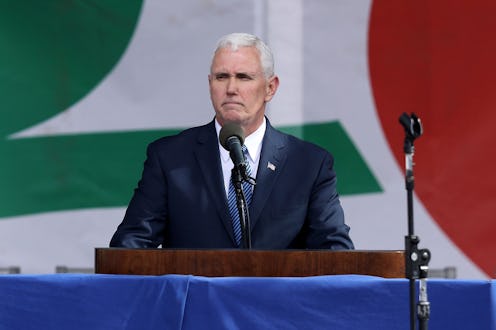News
An Anti-Abortion Law Mike Pence Signed Just Suffered A Huge Setback

On Thursday, an Indiana appeals court ruled that an abortion law signed by Mike Pence is unconstitutional, dealing a major blow to anti-abortion advocates in the state. The specific law was signed by Pence in 2016, back when he was still the state's governor, and it banned women from being allowed to seek so-called "selective abortions" ― for instance, choosing to have an abortion on the basis of a fetal disability or abnormality.
The 7th Circuit Court of Appeals ruled this week that the law constituted an "undue burden" on the women of Indiana, and was therefore an unconstitutional restriction on their reproductive freedoms. Pence signed the bill in March of 2016, and just months later, in June, he was selected to join then-candidate Donald Trump on the GOP presidential ticket.
Judge William Bauer of the 7th Circuit Court of Appeals wrote in his decision that the Indiana law violated longstanding Supreme Court precedents about the rights of women over their own reproductive choice.
"The provisions prohibit abortions prior to viability if the abortion is sought for a particular purpose," Bauer wrote, as detailed by USA Today. "These provisions are far greater than a substantial obstacle; they are absolute prohibitions on abortions prior to viability which the Supreme Court has clearly held cannot be imposed by the State."
"It is entirely inconsistent to hold that a woman’s right of privacy to terminate a pregnancy exists if a woman decides before she becomes pregnant that she does not want to bear a child, but that the State can eliminate this privacy right if a woman later decides she wants to terminate her pregnancy for a particular purpose," he concluded.
Pence, who signed the bill into law, is a well-known anti-abortion hardliner, and since becoming vice president he's used his platform to vocally oppose women's reproductive rights. Specifically, he's claimed that abortion will end "in our time," and is the first sitting vice president to ever address the annual anti-abortion March for Life.
Jane Henegar, the executive director of the American Civil Liberties Union (ACLU) of Indiana, hailed the court's decision as a victory for the women of the state.
"In striking down this extreme abortion ban, the Court once again affirmed a woman’s fundamental right to make her own personal medical decisions. This ruling is a victory for women and another repudiation of attempts by Indiana politicians to restrict – and even ban – access to abortion care," Henegar said in a statement. "Deeply personal decisions about abortion should be made by women in consultation with their doctors—not by politicians or government bureaucrats."
Indiana has long been a fairly conservative, Republican-controlled state, and it's seen a number of anti-abortion laws passed in the past several years. In addition to the now-overturned 2016 law, an omnibus bill passed in 2011 established a ban on all abortions after 20 weeks, and established mandatory ultrasounds and parental informing requirements, among other provisions.
It remains to be seen if Pence will speak out publicly about the law he supported and signed getting struck down, although it's not guaranteed that the case is over and done with just yet. It's still possible that it could be appealed upwards to the Supreme Court, setting up a case with potentially wider-ranging implications for American abortion rights.
As The Indianapolis Star noted on Thursday, however, it's not yet clear whether Curtis Hill, the attorney general from the state of Indiana, will appeal the ruling. Hill is a Republican, however, and an opponent of abortion rights himself, so it would by no means be out of the question for him to do so.